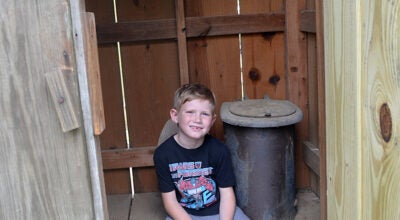Bronner talks economy
Published 11:00 pm Tuesday, April 2, 2013
Dr. David Bronner isn’t shy about creating controversy.
Bronner, chief executive officer of the Retirement Systems of Alabama, brought a bit of that controversial insight to the Troy Rotary Club on Tuesday as he shared his thoughts on the state of the economy in Alabama – and the world – with members.
“If we would put the same amount of tax money the people in Mississippi put in – because we have more people in Alabama – we would have $1.1 billion extra a year,” Bronner said.
And that, he said, is a significant amount of money to invest in programs such as education, state government, and health services – all of which face funding challenges
“Education is important to me because I grew up in a pool hall,” Bronner said. “When I got to college I wasn’t learning until I got all there was to get because there was no way I was going back to that pool hall.
“You’ve got to remember that’s our future … and we’ve done a phenomenal job to be where we are considering the resources we’ve dedicated to education, state government and Medicaid.”
But those resources simply aren’t enough, Bronner said. He challenged the decision by state leaders to reject the portions of the federal health care omnibus bill that would have increased Medicaid funding in the state over the next three years. “When the U.S. government says you can have $15 billion and you don’t have to put anything in for the first three years … you take it,” he said. “In Georgia alone, that’s going to create somewhere around 74,000 jobs just to administer it … it’s too much money to pass up. If you don’t take it, it’s going to go someplace else.”
The future is important to Bronner, who is tasked with managing the public pension fund with assets in excess of $30 billion. While the fund is ranked 45th in the top 1,000 U.S. funds, its future is largely dependent on the financial markets.
“There was a time in 1987 when we were funded at 25 cents on the dollar,” Bronner said. “We got all the way up to 103 percent in 2001, and then we had a decade of disasters, starting with the dot-com bubble in 2001-2002.”
The economic collapse in 2008 – “as close as any of us will ever see to the Great Depression” – ravaged the economy. “I have friends in New York who make over a million dollars a month and were stockpiling food, they were that concerned,” he said. “Now, I have people ask me ‘how do you sleep at night’ and I tell them it’s OK because at the office I have every kind of antacid you can have …”
Those antacids are necessary because so many of the decisions he faces on a daily basis are influenced by factors beyond his control.
“If the stock market moves 500 points, that’s worth $750 million to me, up or down,” he said of the pension fund. “Last year, it did that five or six times.”
Bronner cites two key factors in making the RSA as financially viable as it is today: the fact that it is a single pension fund for all state employees and retirees, more than 325,000 of them, and the fact that he decided to invest a portion of the funds into the state of Alabama through programs such as the Robert Trent Jones Golf Trail. The trail, a renowned collection of 26 championship golf courses at 11 sites, has put Alabama on the list of golf destinations worldwide and helped increase state tourism from a $1.8 billion industry to a $10.7 billion industry. Other high-profile investments for the fund include real estate in Mobile, Montgomery and New York; Community Newspaper Holdings Inc., with more than 160 newspapers throughout the country; and Raycom Media, with 46 TV stations broadcasting to 14 percent of America’s households.
“If you want to see how this can do something for an area go to Greenville,” he said, citing the impact of the Cambrian Ridge golf course. Before the Robert Trent Jones Golf Trail course was built there, the city boasted a restaurant and little else along U.S. 65. Now, the city has nine hotels. “And the revenue off those hotels and that golf course built that nice new high school over there,” Bronner said.




